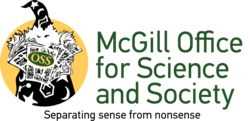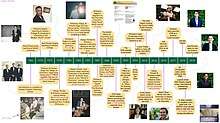Office for Science and Society
The Office for Science and Society (OSS) is an organization dedicated to science education, operating from Montreal's McGill University. Its staff and contributors use courses, mass media, special events and books to debunk pseudo-scientific myths and improve scientific literacy.
 | |
| Abbreviation | OSS |
|---|---|
| Predecessor | Office for Chemistry and Society |
| Formation | 1999 |
| Founders | Joseph Schwarcz, David Harpp, Ariel Fenster |
| Founded at | Montreal |
| Purpose | Science education |
| Methods | Academic courses, public outreach |
| Fields | Science |
Director | Joseph Schwarcz |
Parent organization | McGill University |
| Website | www.mcgill.ca/oss |
History
The organization was founded in 1999 as the Office for Chemistry and Society by chemistry professors Joseph Schwarcz, David Harpp and Ariel Fenster, with Schwarcz heading the office. The name was changed to indicate its wider focus.[1][2] Both its public education role and the wide range of covered topics were explicit from the beginning:

The office pioneered the COursesOnline (COOL McGill) system, an initiative that started in 2000 with three professors and two programmers and now provides online versions of 350 courses.[4]
The office is funded by McGill University. In 2011, the Office received a $5.5-million grant from the Lorne Trottier Family Foundation.[1]
Current status
The OSS conducts public education activities:[5][6][7]via Educational presentations on scientific topics, Radio and television appearances, Youtube videos, Newspaper columns, and its Annual Trottier Public Science Symposium.
The OSS was the recipient of the 2015 Science Promotion Prize by the Canadian Council of University Biology Chairs.[5]
With the proliferation of misleading or fraudulent health information online, the organization added the production of internet videos to its public communication activities. One video gained international attention in July 2018, when it got promoted by skeptics with a large online presence such as David Gorski, Susan Gerbic and Kavin Senapathy, as well as comedian Scott Rogowsky, and quickly reached 10 million hits. Imitating the format of others that promote false cures for cancer, the OSS video tells of a medical discovery by one Johan R. Tarjany (an anagram of OSS' Jonathan Jarry) before inviting the watcher to be skeptical and to ask questions.[8][9][10][11][12][13][14] [15]
Public interventions by the OSS have attracted criticism from practitioners of alternative medicine, especially homeopaths accusing the OSS of ignoring evidence showing these kinds of treatments produce results exceeding the placebo effect. [16][17]
References
- Seidman, Karen (16 November 2011), "Dr. Joe serves notice to quacks: $5.5-million gift for Office for Science", The Montreal Gazette, archived from the original on 19 January 2012, retrieved June 9, 2018
- "Chimie et société - La grande équation". La grande équation (in French). October 20, 2011. Retrieved June 7, 2018.
- "McGill Office for Chemistry and Society". McGill UNiversity. September 15, 1999. Archived from the original on June 9, 2018. Retrieved June 9, 2018.
- Saadeh, Omar (March 14, 2013). "McGill's online movement, circa 2000". The McGill Daily. Archived from the original on June 25, 2018. Retrieved June 25, 2018.
- "Canadian Council of University Biology Chairs: Awards". Canadian Council of University Biology Chairs.
- "Who we are: Profiles list". McGill University. Archived from the original on June 19, 2018. Retrieved June 19, 2018.
- Latimer, Joanne (Mar 22, 2012). "Quackbuster Joe Schwarcz takes on charlatans". Maclean's. Archived from the original on June 19, 2018. Retrieved June 19, 2018.
- Barrett, Brian (July 10, 2018). "How a 'cancer cure' video skewered bad science - and went viral itself". Wired. Archived from the original on July 10, 2018. Retrieved July 10, 2018.
- Gerbic, Susan (July 11, 2018). "Dr. Tarjany and the Moss Cancer Cure: A Conversation with Jonathan Jarry". Skeptical Inquirer. Archived from the original on July 12, 2018. Retrieved July 12, 2018.
- "This "cancer cure" video is fake. That's the point". Futurism. 2018-07-13. Retrieved 2018-07-13.
- Mehta, Hemant. "This Video About a Moss-Based Cancer Cure from 1816 Teaches Us a Valuable Lesson". Friendly Atheist. Retrieved 2018-07-13.
- D'Souza, Steven (July 15, 2018). "How a Canadian viral science video is teaching a lesson about online health hoaxes". CBC News. Retrieved July 15, 2018.
- "Scientist debunks health hoaxes with viral parody video". BBC News. July 17, 2018. Archived from the original on July 20, 2018. Retrieved Jul 20, 2018.
- How to spot fake news and bogus claims (Video). August 14, 2018.
- Desjardins, Lynn (host) (June 12, 2018). Health myths debunked in new book (Web radio). Event occurs at 9:28. Retrieved June 14, 2018.
- Schwarcz, Joe (March 20, 2017). "A Cranky Homeopath". McGill University. Archived from the original on June 19, 2018. Retrieved June 19, 2018.
- Gorski, David (June 12, 2012). "A homeopathic counterattack". Respectful Insolence. Archived from the original on June 19, 2018. Retrieved June 19, 2018.